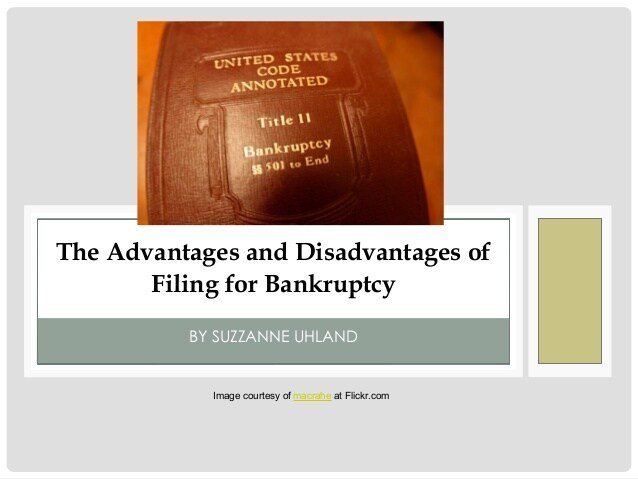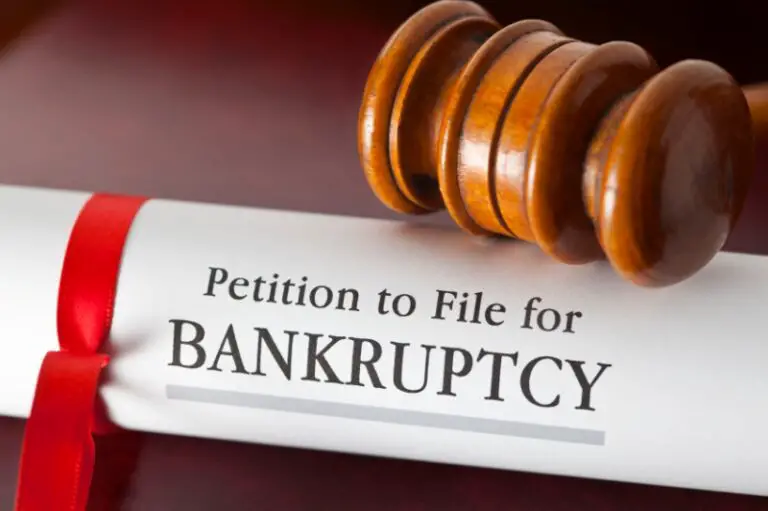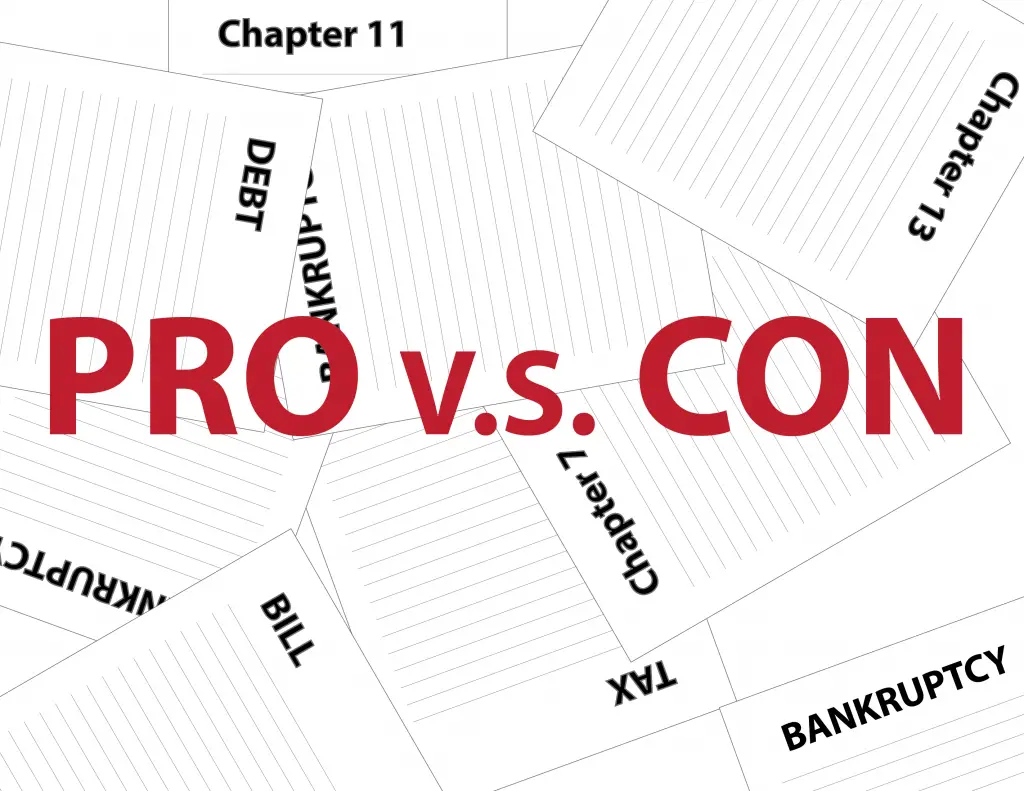Bankruptcy: How It Works Types & Consequences
Bankruptcy is a legal process overseen by federal bankruptcy courts. It’s designed to help individuals and businesses eliminate all or part of their debt or to help them repay a portion of what they owe.
Bankruptcy may help you get relief from your debt, but it’s important to understand that declaring bankruptcy has a serious, long-term effect on your credit. Bankruptcy will remain on your credit report for 7-10 years, affecting your ability to open credit card accounts and get approved for loans with favorable rates.
When Filing For Bankruptcy You Have Options
If your financial situation prevents you from repaying all of your debts, bankruptcy may be a feasible alternative for financial recovery. You should think about these alternative choices before filing for bankruptcy to get your finances back on track:
- To achieve a mutually beneficial debt settlement, work directly with your creditors.
- Until you can get back on your feet, ask creditors for payment deferments, extensions, or reductions.
- Consider combining your debts into a single loan with a single payment.
Consolidating debt has a number of hazards. A local lawyer can help you determine if these alternatives will help you get out of your present financial position or whether bankruptcy protection is a better option for you.
The Things That Happen Immediately After Filing Bankruptcy
As soon as you file your Chapter 7 bankruptcy, you are given a case number and a bankruptcy trustee is assigned to your case. The bankruptcy trustee will oversee your bankruptcy filing, will review your bankruptcy forms, and may ask for additional documents to verify your information. The trustee will also conduct the meeting of creditors.
Protection from your creditors begins immediately after filing for Chapter 7 or Chapter 13 bankruptcy. This is called the automatic stay. Once you file and the automatic stay takes effect, your creditors are not allowed to take collection action against you.
After you file for bankruptcy protection, your creditors can’t call you, or try to collect payment from you for medical bills, credit card debts, personal loans, unsecured debts, or other types of debt. Wage garnishments must also stop immediately after filing for personal bankruptcy.
Read Also: How Long Does Chapter 11 Bankruptcy Stay On Credit Report
Calculating Your Current Monthly Income
Your current monthly income under the means test is based on your monthly income in the 6 months before your bankruptcy filing. This doesnât include the month your bankruptcy case is filed in. For example, someone filing Chapter 7 bankruptcy in July calculates their current monthly income based on how much they earned from January 1 to June 30.
Step 1: Add up all income from the last 6 months.
Your monthly income is calculated by adding up all countable gross income you received in the 6 month period youâre using for your means test. Gross income is not the same as your take-home income. Itâs before taxes and other deductions are taken out.
Countable income includes income from wages, alimony, child support, rental income, and any other money you receive on a regular basis. Social security income is not added when calculating your current monthly income. If your only source of household income is SSI or SSDI, you pass the Chapter 7 means test without having to do any math.
Step 2: Divide the result by 6.
Step 3: Use your current monthly income to determine your annual income.
Take your current monthly income as calculated and multiply it by 12. This is your annual income according to the means test calculation. Compare that number to the annual income for your household size in your state.
It May Be Your Only Choice But Know The Consequences Before Deciding

Chip Stapleton is a Series 7 and Series 66 license holder, CFA Level 1 exam holder, and currently holds a Life, Accident, and Health License in Indiana. He has 8 years experience in finance, from financial planning and wealth management to corporate finance and FP& A.
Peope who have racked up more debt than they can repay are sometimes left to ponder whether they should file for bankruptcy. There are several reasons it might make sense to take the plunge and file for Chapter 7 bankruptcy or Chapter 13 bankruptcy. However, making that decision also carries some serious consequences.
Recommended Reading: How Many Bankruptcies For Trump
Stop Most Creditors In Their Tracks
- Once you file, collection calls must cease. The same holds true for many lawsuits, wage garnishments, foreclosures, and repossessions because the court puts an automatic stay in place that prohibits creditors from pursuing you. The stay wont stop all creditor actions, though. Youll still pay support payments, and some lawsuits will continue, such as criminal cases. The stay might not apply if youve filed multiple bankruptcy cases, too.
Debts Will Be Settled For Less Than What You Owe
Your creditors will be forced to accept whatever payment is determined in your bankruptcy case. This includes receiving no payment at all. If you qualify for a Chapter 7 you could have all of your unsecured debts liquidated your credit card debt, your small loan balances, . You wouldnt have to pay any of that back, McClary stated.
However, if you file Chapter 13, that gets a little bit trickier because you may have to pay some of that back depending on the decision of the bankruptcy trustee and the creditors that you owe, he said. Its all based on your current financial situation and the capacity that you have to repay.
Recommended Reading: Taco Bell Filing Bankruptcy
Discover The Benefits Of Filing For Bankruptcy
When you are seeking bankruptcy protection, our firm represents individuals and small business owners who want to file Chapters 7 and13 bankruptcy cases. We can help you navigate through the more complex filings of debt reorganization through Chapter 11 bankruptcy and with Chapter 12 bankruptcy for family farmers.
You might also be able to retain your assets even if you file for bankruptcy. If you are ready to file for bankruptcy protection and to start eliminating crippling debt, contact the team members at Farmer & Morris Law, PLLC by calling today.
Reasons To File For Bankruptcy
There are some circumstances in which filing for bankruptcy may be your best recourse:
- You’ve already tried to negotiate. Suppose that you have attempted to negotiate a repayment plan with one or more major , as experts often recommend as a first step, but they have not budged. They want their full payment and aren’t willing to be paid out over timeand you don’t have the means to make that payment. This can leave you with few options other than to file for bankruptcy.
- Your liabilities far exceed your income and assets. Another major reason some individuals file for bankruptcy is that they simply cannot pay their debts, and just servicing the debtthat is, making the required monthly paymentsexceeds the monthly income they generate. For example, consider someone who owes $500,000 to a bank and whose monthly mortgage payment is $4,000. If this person only has income of $2,000 a month, and another $25,000 in assets to draw on, they may have few other options than to file for bankruptcy. Otherwise, they will deplete their assets in about a year and be completely unable to make that $4,000 payment going forward.
Read Also: How To File Bankruptcy In Texas Without An Attorney
When To File For Bankruptcy
Bankruptcy is not good or bad in and of itself. It accomplishes a specific thing and allows debtors to get themselves back on their feet. Many folks ask us: When is the best time to file for bankruptcy? The idea of treating bankruptcy as a last resort is a wise one, but if you wait too long to play that card, you could find yourself in financial peril.
At some point or another, a creditor will initiate a lawsuit against you. If they win that lawsuit, they can begin garnishing your wages, levying your bank account, and putting liens on your real estate. In some cases, they may begin liquidating your assets. In order to prevent this from happening, you can file for bankruptcy. This immediately terminates all creditor actions against you while your bankruptcy is being processed.
If you know youre going to lose the lawsuit, the time to contact a bankruptcy attorney is sooner rather than later. Liens may not be discharged in bankruptcy and if the creditor attempts to garnish your wages, they will have to contact your employer and demand they set money aside from your check which would be embarrassing.
The Pros And Cons Of Filing For Bankruptcy
PROS OF FIILING FOR BANKRUPTCY:
When you file for bankruptcy, it initiates an automatic stay. This means that creditors, lenders, and debt collectors cannot take any action against you or contact you. They cannot attempt to get payment or call to harass you once you file. If they do, you can sue them for violating the law and collect damages.
The automatic stay also can delay foreclosure and repossession actions. As long as the automatic stay is in place while you go through the filing process, lenders cant move to take your home or other property. Bankruptcy also will not leave you without assets. While courts may potentially liquidate assets during Chapter 7, even your home and car may be exempt from liquidation. So, you even with a Chapter 7 filing, you could likely keep more assets that you might expect. An experienced bankruptcy attorney can review your case and tell you what assets you can retain and which ones may be liquidated in a chapter 7 case. The great thing about bankruptcy is that In the end, you will not be burdened by all the debts you need to repay. The ability to wipe out most debts and focus on rebuilding for the future is priceless to many people.
CONS OF FIILING FOR BANKRUPTCY:
If you have any questions about Chapter 13 bankruptcy or bankruptcy in general please feel free to go to or contact us at
Also Check: What Is Epiq Bankruptcy Solutions Llc
Filing Bankruptcy Doesnt Come Cheap
Theres a filing fee charged by the bankruptcy court that you must pay, or your case will be thrown out. Thankfully, the court allows you to clear this filing fee in up to four payments if youre unable to pay it in a lump sum.
Youll also need to hire an attorney. The vast majority of bankruptcy cases are dismissed, especially where the people filing them have no attorney to guide them along the way. As you can imagine, hiring a seasoned bankruptcy attorney doesnt come cheap, but its all worth it.
Besides filing fees and attorney expenses, youll be required to pay for a credit counseling class.
Is My Bankruptcy A Public Record

Only if theyre really nosy.
Bankruptcies are public record, but the information is rarely published unless the filer is famous, like Donald Trump. Bankruptcies are public record, so any member of the public can visit the clerk of the bankruptcy court and ask to see a persons file.
Its also possible to access the information via the internet by signing up for a PACER account in the federal court system. But its a costly move usually done by bankruptcy attorneys.
One thing to remember is that when you file for bankruptcy you must list all the people you owe money to. No one is bound to secrecy, though the chances of your bankruptcy becoming the talk of the town are not anything to lose sleep over.
You May Like: Bankruptcy Petition Preparer Training
You May End Up In A Worse Financial Position
Even when working with an attorney, the chances of your bankruptcy case being dismissed are higher than being granted.
If your case gets dismissed, youre left in a worse financial state than you were to start with. Thats because, during your case, the interest on your debt has been mounting. As soon as your bankruptcy protection is removed, youre left in more debt than before.
Theres also the fact that youve spent money on an attorney and the filing process without reaping the primary benefit of filing for bankruptcy, which is to get a fresh start.
Some Of Your Debts May Not Be Discharged
This is true. When you file for Chapter 7, only your unsecured debts will be discharged. On the other hand, if you have any valuable assets, the bankruptcy trustee can seize them and liquidate them to repay your creditors. Most Chapter 7 filers dont, however, due to the fact that, in order to qualify, you must make below the state median. Additionally, you are allowed to protect certain assets in bankruptcy from liquidation including personal property up to a certain amount. Nonetheless, Chapter 7 will not discharge debts secured against collateral and you will need to keep paying on them in order to keep them. If it turns out that you dont want to keep them, Chapter 7 can discharge your remaining penalty and the outstanding balance of the debt.
Additionally, there are some debts that cannot even be discharged in Chapter 13. These debts can be rolled into a Chapter 13 repayment plan, but they are only allowed to take up so much money. Once your Chapter 13 is over, you will have to continue making payments on that debt until it is paid in full. Common examples include student loans, tax debts, and child or spousal support payments.
Also Check: How Many Times Has Trump Declared Bankruptcy
Filing Bankruptcy In California Pros And Cons
Filing bankruptcy in California is in important decision that comes with several pros and cons. Its important to note that bankruptcy filing involves several factors that may affect how your financial situation evolves. Many people believe bankruptcy is a safe and quick way to relieve financial pressure. Although it has several benefits that can help people, it also has its cons.
When it comes to a bankruptcy filing, people must consider both the advantages and disadvantages of the process before choosing the tools theyre going to use. This article is going to go over the pros and cons of filing bankruptcy in California, as well as how to choose the best option for your particular case.
If You Have Good Credit It Will Likely Take A Temporary Hit
Those that are able to maintain their monthly payments and keep their credit score high before filing their bankruptcy petition will see their score drop initially. But, a bankruptcy filing often does more good than harm to the filerâs credit score. Plus, once their bankruptcy discharge is granted, they can begin increasing that pesky credit score immediately.
Recommended Reading: Can You Rent An Apartment While In Chapter 13
Not Everyone Is Subject To The Chapter 7 Income Limits
Exception for Non-Consumer Debt. If more than 50% of your debt is considered non-consumer debt, youâre automatically exempt from the means test calculation. Non-consumer debt is also called business debt because itâs incurred with a business or profit motive. If youâre not sure if you have business debt, consider speaking to a bankruptcy attorney about your situation and the types of debt you have.
Exception for Qualifying Service Members and Veterans. Disabled veterans, reservists called to active duty and members of the national guard don’t have to count compensation connected to their service as part of the bankruptcy means test. This protection was recently expanded when the HAVEN Act was passed by Congress.
Anyone who qualifies for one of these exceptions to the bankruptcy income limits has to file Official Form 122A-1Supp instead of their bankruptcy means test form. This form, titled the Statement of Exemption from Presumption of Abuse Under § 707, lets the bankruptcy court know that youâre not subject to the income limits.
Pros Of Filing For Bankruptcy
Its important to note that bankruptcy filings are not an easy way to avoid paying for credit cards, paying off student loans or child support, or get a fresh start immediately. Theres a much more complicated process that everyone must follow carefully if they want to take care of their debt/credit with a bankruptcy discharge. In essence, its vital to know the pros and cons of filing for bankruptcy in California.
Here is a list of some of the most common benefits of filing bankruptcy:
Don’t Miss: How Many Bankruptcies Has Donald Trump Filed
Will My Employer Find Out
Not necessarily. The most likely way would be if a creditor has sued you and is garnishing your wages. If the garnishment stops due to bankruptcy proceedings, your employer has to be notified since it cuts your checks.
But if your wages are being garnished, your employer already knows youre under financial stress and might be relieved you have filed for bankruptcy to start digging yourself out.
With Chapter 13, the court could order that payments be automatically deducted from your wages and sent to creditors. But the bankruptcy code has rules that prohibit employers from discriminating against employees based solely on bankruptcy filings.
Making Changes To Your Bankruptcy Forms

Your bankruptcy forms are signed under penalty of perjury. When you file, you’re declaring that the information in your bankruptcy forms is true and correct to the best of your knowledge. If you accidently leave something out or make a mistake, you’ll need to make changes to your forms.
This is done by filing an amendment with the court. You might need to file an amendment because you forgot to list an asset or a , you need to add information that was originally missed, you change your mind about signing a reaffirmation agreement, or the trustee requests that forms be amended.
You May Like: Oregon Bankruptcy Means Test